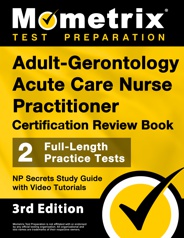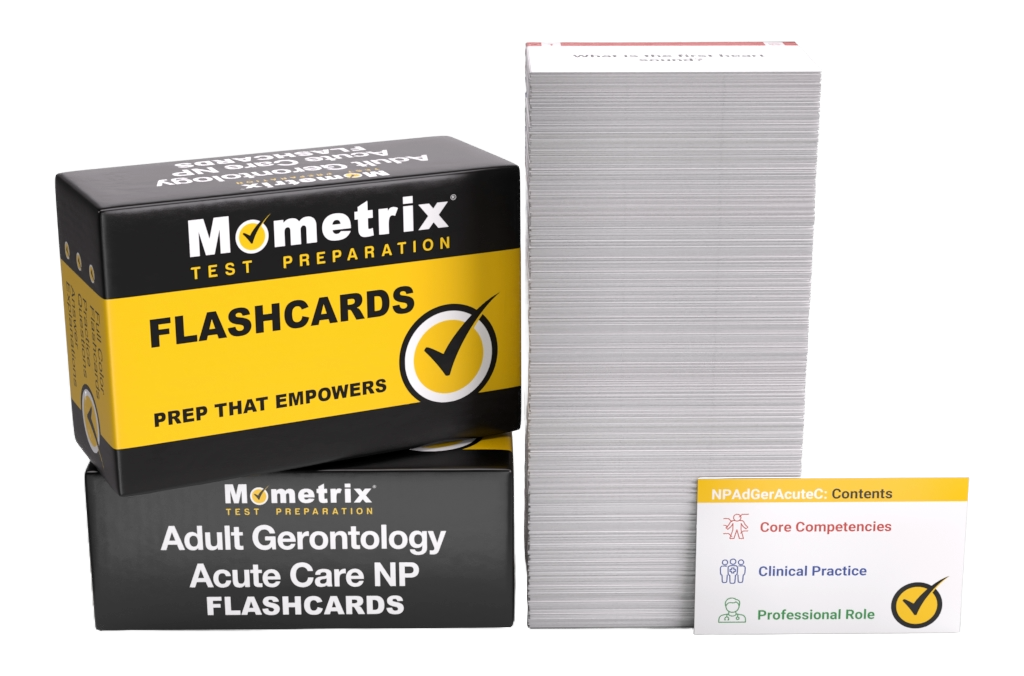The Adult-Gerontology Acute Care Nurse Practitioner certification (AGACNP-BC) is a credential awarded by the American Nurses Credentialing Center (ANCC) to registered nurses who pass the Adult-Gerontology Acute Care Nurse Practitioner exam, demonstrating the necessary skills and competencies for entry-level positions.
Click “Start Test” above to take a free Adult-Gerontology Acute Care Nurse Practitioner practice test, and check out our premium-quality nursing test prep resources by clicking the links below!
Eligibility
To be eligible for this exam, you must hold a current, valid RN license and meet all of the following requirements:
- You must hold an AGACNP master’s degree, post-grad certificate, or DNP
- You must complete three separate graduate-level APRN Core courses in the following areas:
- Advanced physiology/pathophysiology
- Advanced health assessment
- Advanced pharmacology
Exam Outline
The Adult-Gerontology Acute Care Nurse Practitioner exam contains 175 multiple-choice questions, 25 of which are unscored, and you will be given a time limit of 3.5 hours. The unscored questions are used by ANCC to validate questions for future versions of the exam.
The exam is split into three content categories, and each category contains some number of knowledge questions and skill questions.
I. Core Competencies (36 scored questions)
The questions in this category assess your advanced physical assessment skills. You will also be tested on your knowledge of the following:
- Advanced pathophysiology
- Advanced pharmacology
II. Clinical Practice (65 scored questions)
The questions in this category assess your skills in risk stratification, diagnostic testing, and pharmacologic and non-pharmacologic treatments. You will also be tested on your knowledge of the following:
- Standards of care
- Cost-effective care
- Psychosocial factors
- Health promotion and disease prevention
- Standardized assessment tools
III. Professional Role (49 scored questions)
The questions in this category assess your skills in research, educational strategies, health literacy, and relationship development. You will also be tested on your knowledge of the following:
- Scope of standards of professional practice
- Healthcare policy and systems
- Quality improvement processes
Check out Mometrix's Adult-Gerontology Acute Care Nurse Practitioner Study Guide
Get practice questions, video tutorials, and detailed study lessons
Get Your Study Guide
Registration
To register for the exam, you must submit an application via the ANCC website. Your application should include all of the necessary proof-of-eligibility documentation and the applicable examination fee.
| Membership | Fee |
|---|---|
| AANP Student Member | $290 |
| ANA Member | $295 |
| AANP Member | $340 |
| GAPNA Member | |
| Non-member | $395 |
Once your application is approved, you will receive a confirmation email containing your Authorization to Test (ATT) and information about scheduling your examination appointment.
Test Day
On test day, you should arrive at the testing center 15-30 minutes before the exam is scheduled to begin. This will allow time for the heck-in process. Once you arrive, you will be asked to provide two forms of identification, one of which must contain your photo and signature.
Personal items (cell phone, coat, wallets, keys, bags, etc.) are not allowed in the testing area, so you will be asked to leave them in a secured locker before the exam begins.
Once the check-in process is complete, you will be led to your testing station and given a short tutorial on the testing system before beginning your exam.

How the Exam is Scored
The scores for the Nurse Executive exam are calculated using a criterion-based scoring system. This means that a panel of ANCC subject-matter experts has evaluated the questions and determined a passing score. The passing score is set using a modified version of the Angoff method, which means that your score is based solely on your performance, without any input from the performance of other test-takers.
Your score is reported on a scale of 1 to 500, and you must get a score of at least 350 to pass the exam.
You will be able to see your preliminary scores as soon as you complete the exam, and your final score report will be made available via your ANCC account.
Check out Mometrix's Adult-Gerontology Acute Care Nurse Practitioner Flashcards
Get complex subjects broken down into easily understandable concepts
Get Your Flashcards
Adult-Gerontology Acute Nurse Practitioner Online Prep Course
If you want to be fully prepared, Mometrix offers an online Adult-Gerontology Acute NP prep course designed to give you everything you need to succeed!
Here’s what you’ll find in the Adult-Gerontology Acute NP course:
- 100+ Review Lessons Covering Every Topic
- 700 AGNP Practice Questions
- 100+ Video Tutorials
- 1,000+ Digital Flashcards
- Money-back Guarantee
- Mobile Access
Everyone learns differently, so we’ve tailored the Adult-Gerontology Acute NP online prep course to ensure every learner has what they need to prepare for the Adult-Gerontology Acute NP exam.
Click below to check it out!
FAQs
Q
How many questions are on the Adult-Gerontology Acute Care NP exam?
A
There are 175 multiple-choice questions on the exam.
Q
How long is the Adult-Gerontology Acute Care NP exam?
A
The time limit for the exam is 3.5 hours.
Q
What is the passing score for the Adult-Gerontology Acute Care NP exam?
A
To pass the exam, you must achieve a scaled score of at least 350.
Q
How much does the Adult-Gerontology Acute Care NP exam cost?
A
The examination fee is $395. AANP, ANA, and GAPNA members will receive a discount.


